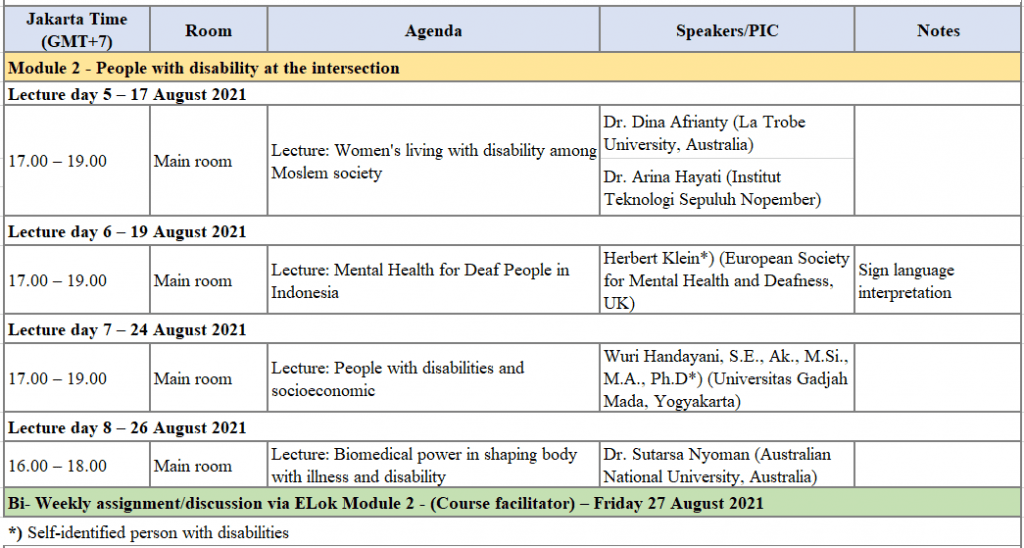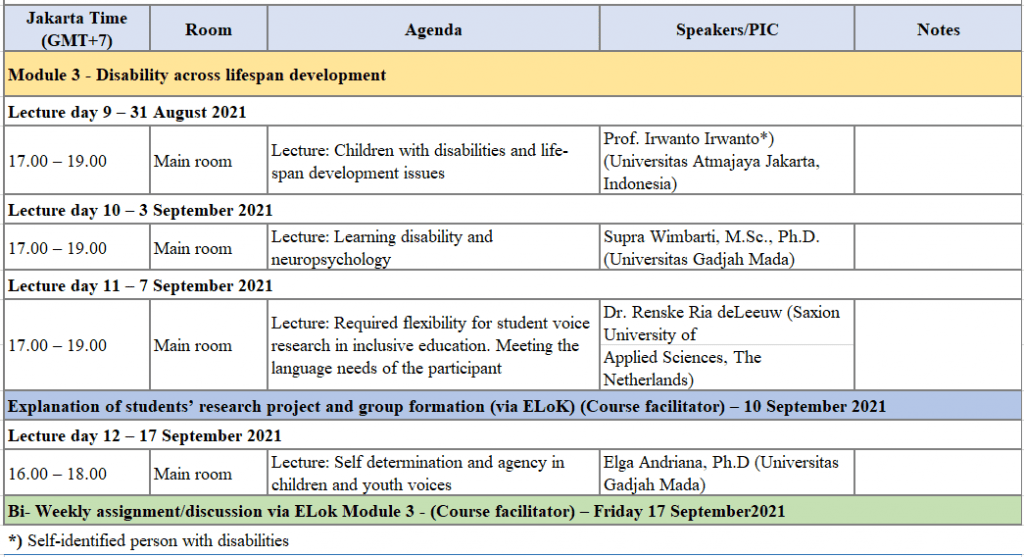
International Online Summer Course on DIsability and Lifespan Development: Indonesia and Global Perspectives
In 2021, the Center for Life-Span Development (CLSD) Faculty of Psychology, Universitas Gadjah Mada for the very first time held a summer course entitled International Online Summer Course on Disability and Lifespan Development: Indonesia and Global Perspectives. Collaborating with Indonesia and global experts on disability studies, this summer course will serve as a channel to facilitate critical learning to unpack and understand intersecting barriers dealt by people with disabilities and encourage knowledge and practice sharing and debates, while building network, between experienced and young scientists in the field of disability studies, which will inspire creation of new research initiatives and field applications.
This summer course is a collaboration between CLSD, Faculty of Psychology, and OIA (Office of International Affairs) Universitas Gadjah Mada. We invited fifteen international speakers and five national speakers with various backgrounds and fields of study from various parts of the world, including Malaysia, United Kingdom, Australia, New Zealand, and the United States. Each expert presents a comprehensive, specific, and in-depth topic in order to dissect the realm of disability and the range of human development viewed from various perspectives. Not only attended by 65 Indonesian students but this summer course activity was also attended by approximately 45 international students and professionals from various parts of the world, such as West Africa, Australia, Pakistan, Nepal, Tanzania, Philippines, Ghana, Bangladesh, Malaysia, Iran, Romania, Nigeria, South Africa, and the United States.
The course consisted of five different modules, each highlighting different topics delivered by local and international experts coming from various backgrounds experience. Module 1, which titled Understanding Disability and Intersectionality, talked about the conceptual understanding of disability and intersectionality in general.

As for Module 2, the participants were given lectures on the subject of People with Disability at the Intersection. This module covered, investigated, and discussed how people with disabilities are dynamic in society and what their daily lives are like.

Furthermore, the focus of learning continues on the topic of life-span development. Titled Disability across lifespan development, this module facilitated students to discuss disability from a human development perspective that focuses on certain age ranges, life-span development issues, learning disabilities and neuropsychology, the practice of involving student in research on inclusive education in order to meet the needs of the subject, and the importance of listening to children with disabilities’ voices while enabling their agency and self-determination.

The course went on with Module 4, which covered the topic of Collaborative Disability and Lifespan Development Research in a Multicultural Setting. The discussed subjects were disability and family, discourse regarding disaster risk mitigation and research involving children with disability, and a universal design to support the learning process of children with disability. This course also talked about the intersection between curriculum, pedagogy, and assessment with the implications for disabled people, their families, and their teachers.

Lastly, the last module was delivered and simultaneously closed the whole series of the summer course. Besides discussing disability and disasters, the other two courses explored and investigated the theory and practice of conducting research around disability matters, such as co-designing and co-producing research with people with disabilities, and research involving people with disabilities in service-learning in the community.
Taking place over two days, eight groups of students presented their research proposals at the Student-Led Conference, with four examiners: Dr. Pradytia Putri Pertiwi, Dr. Elga Andriana, Dr. Wuri Handayani, and Prof. David Evans from The University of Sydney (Australia). At this event, other participants who took part in the student-led conference session were also welcome to ask questions regarding the research proposals that had been presented.

The International Summer Course on Disability and Life-Span Development: Indonesia and Global Perspectives has come to an end. With a total of 20 sessions, 21 speakers from 7 different countries, and 110 participants from 15 countries, our summer course ran from August 3 to October 14, 2021. At the final session, our student-led conference accommodated eight hard-working student groups to showcase their research ideas as the course learning outcome.
Massive thank you to our speakers for sharing their valuable insight and expert knowledge on disability and life-span development, and to all of our participants for having actively participated and supported our event by attending sessions and contributing their ideas. We hope to see you at our upcoming events in the future.
(SRP CLSD)
